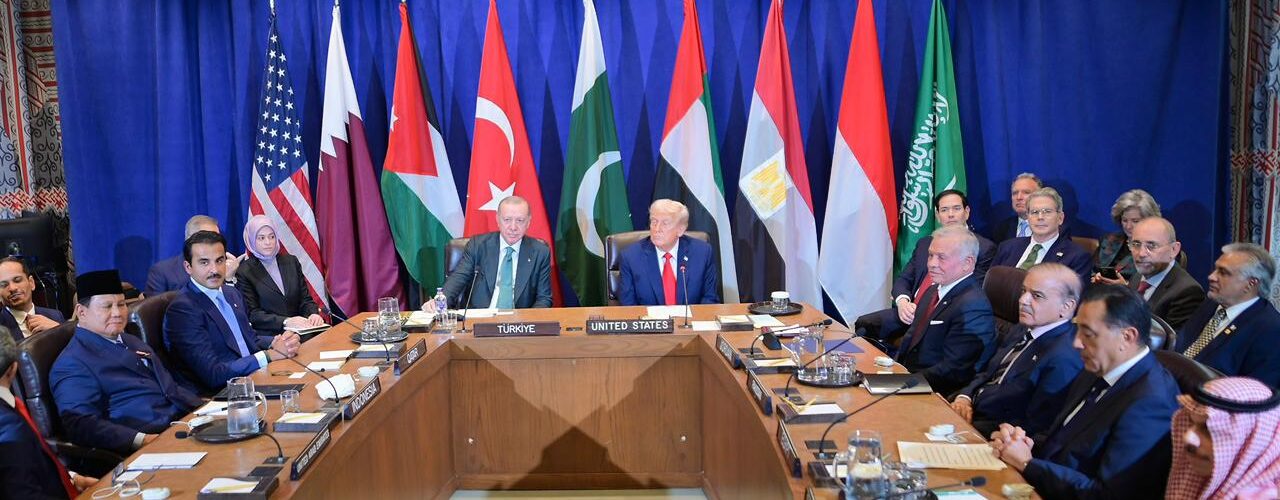Circle of the Tyrants

Getting your Trinity Audio player ready...
|
Two years of genocide in Gaza, not to mention Palestine more generally, and now an even worsening level of brutal atrocities in Sudan, has often prompted many to ask – ‘why don’t the Muslim countries stop this?’ or ‘what are the Muslim countries even doing?’ At times this is also expressed as – ‘why are they not supporting the Palestinians?’ Answers to questions such as these though involve confronting some bitter truths that many still cannot countenance.
Overall the situation in Gaza and Palestine remains dire. The war has also expanded to cover the territories of Lebanon, Syria and even as far afield as Yemen and Iran. As far as Israel’s war aims are concerned, we needn’t detain ourselves expounding them, others have lucidly explained them. Suffice to say that the pursuit of the ‘greater Israel’ project remains paramount for them, by necessity that involves the ethnic cleansing of Gaza and the West Bank. Coupled with that is the drive for further regime change and balkanisation of the region. The understanding in the minds of Israel’s leaders being that they cannot be at rest until the entire region is subjugated to them, and if at all possible, fractured into weak statelets.
Yet while the world reacts with horror at each phase and new atrocity, the circle of the tyrants remain stubbornly indifferent. Beyond some limited posturing and the odd statement of condemnation, very little is done at the state-level to actually alleviate the situation of the Muslims of Palestine, let alone Sudan. Even nations as far afield as South America have done far more in cutting diplomatic ties and some even expelling the Zionist diplomatic presence.

O you who believe, do not take the Jews and Christians as allies, they are allies only to each other. Anyone who takes them as an ally becomes one of them – Allah does not guide such wrongdoers. [Qur’ān, 5: 51]
In league with Satan
We find ourselves at a crossroads, once again. From the Atlantic ocean in the West, to the Persian Gulf, the bitter reality is that Israel has a series of loyal passive allies occupying positions of power. Each under the thumb of servitude to the United States, the elites are all too happy to continue hand-wringing, issue banal statements, while looking at the trail of destruction across the region. All the while, they quietly support Israel’s actions. Whether that is allowing off-duty soldiers who have undertaken heinous war crimes to ‘holiday’ through to the active supply of oil, coal, and other materials. Regional alliances were clearly on display during the 12-day war with Iran back in June, when a large swathe of the region’s ‘Muslim countries’ were activated to defend Israel from missile strikes.
Fundamentally there needs to be an open and honest acknowledgment that for far too long, collectively, we as the Muslim Ummah have tolerated the presence of this. We have become accustomed to expecting that political ruling in the Muslim world is characterised by corruption, oppression and despotism. Added to that repertoire now is either active or passive acquiescence to genocide. Those holding positions of power throughout the Muslim world, who neither adhere to the principles of Islam nor are they ashamed of their open allegiance to the enemies of Islam. Compounding this situation are other groupings, often identifying as Islamic movements yet they only seem to be galvanised into action when it involves regime change operations orchestrated on behalf of the CIA and its regional allies, the circle of tyrants.

The favoured son of Mossad and the CIA now ruling Syria. And some had the audacity to call that a ‘blessed revolution.’
Neglected injunctions
Beyond reminding others to make duʿā (supplication) for the oppressed and to give generously to those in need, which really should be a given, there are other textual injunctions which are of direct applicability to this malaise. However it often seems that these receive barely a mention. Critically, these are all too often overlooked too by the scholarly community and even activists, but they are of paramount importance. We begin, with the Qur’ānic injunction to uphold justice.
ياأيها الذين آمنوا كونوا قوامين بالقسط شهداء لله ولو على أنفسكم أو الوالدين والأقربين إن يكن غنيا أو فقيرا فالله أولى بهما فلا تتبعوا الهوى أن تعدلوا وإن تلووا أو تعرضوا فإن الله كان بما تعملون خبيرا
O you who believe, uphold justice and bear witness to Allah, even if it is against yourselves, your parents, or your close relatives. Whether the person is rich or poor, Allah can best take care of both. Refrain from following your own desire, so that you can act justly – if you distort or neglect justice, Allah is fully aware of what you do.[1]
إن الله يأمر بالعدل والإحسان وإيتاء ذي القربى وينهى عن الفحشاء والمنكر والبغي يعظكم لعلكم تذكرون
Allah commands justice, doing good, and generosity towards relatives and He forbids what is shameful, blameworthy, and oppressive. He teaches you, so that you may take heed.[2]
Rather than reiterate comments made elsewhere, as we have previously set out a short reminder on the command to uphold justice to which readers can refer back to. Next, we turn to the matter of enjoining the good and forbidding the evil.
وَالْمُؤْمِنُونَ وَالْمُؤْمِنَاتُ بَعْضُهُمْ أَوْلِيَاءُ بَعْضٍ ۚ يَأْمُرُونَ بِالْمَعْرُوفِ وَيَنْهَوْنَ عَنِ الْمُنكَرِ وَيُقِيمُونَ الصَّلَاةَ وَيُؤْتُونَ الزَّكَاةَ وَيُطِيعُونَ اللَّهَ وَرَسُولَهُ ۚ أُولَٰئِكَ سَيَرْحَمُهُمُ اللَّهُ ۗ إِنَّ اللَّهَ عَزِيزٌ حَكِيمٌ
The believers, both men and women, support each other; they order what is right and forbid what is wrong; they keep up the prayer and pay the prescribed alms; they obey Allah and His Messenger. Allah will give His mercy to such people, Allah is Almighty and wise.[3]
Writing in al-Muḥalla Ibn Ḥazm said:
Enjoining the good and forbidding the evil is farḍ (obligated) upon everyone – subject to capability. (It is done) with the hand, whoever is not able to do so, then with the tongue, and whoever is not able to do so, then with the heart, which is the weakest of ‘Imān. There is nothing beyond that of ‘Imān. He the Mighty and Sublime has said:
ولتكن منكم أمة يدعون إلى الخير ويأمرون بالمعروف وينهون عن المنكر وأولئك هم المفلحون
Be a community that calls for what is good, urges what is right, and forbids what is wrong: those who do this are the successful ones.[4]
حدثنا أبو بكر بن أبي شيبة ومحمد بن المثنى قال ابن أبي شيبة ثنا وكيع عن سفيان الثوري، وقال ابن المثنى ثنا محمد بن جعفر ثنا شعبة، ثم اتفق سفيان وشعبة، كلاهما عن قيس بن مسلم عن طارق بن شهاب قال قال أبو سعيد الخدري سمعت رسول الله صلى الله عليه وسلم يقول من رأى منكم منكرا فليغيره بيده، فإن لم يستطع فبلسانه، فإن لم يستطع فبقلبه، وذلك أضعف الإيمان
Abu Bakr ibn Abi Shayba and Muḥammad ibn al-Muthanna narrated to us; Ibn Abi Shayba said Waki’ narrated to us from Sufyān al-Thawri; Ibn al-Muthanna said Muḥammad ibn Ja’far narrated to us Shu’ba narrated to us, then following Sufyān and Shu’ba, both of them (narrating) from Qays ibn Muslim from Ṭāriq ibn Shihāb, he said Abu Sa’eed al-Khudri said, I heard the Messenger of Allah peace and blessings be upon him saying: ‘Whoever among you sees an evil, let him change it with his hand; if he cannot, then with his tongue; if he cannot, then with his heart- and that is the weakest of ‘Imān.’[5]
Never did the Prophet peace and blessings be upon him, command us to acquiesce, support or even tacitly act as a prop to evil. Rather, the command as clearly elucidated was to change it, albeit depending upon one’s capability. Perhaps a matter not always emphasised though is the generality of the wording as expressed by the Prophet, peace and blessings be upon him in this famous ḥadith. Within the matn (reported text) of the ḥadith, there is no specific limitation upon where this munkar (evil) is emanating from. This is significant. Those enchanted by political power, regardless of its persuasion let alone adherence to Islam would ardently like to exclude those in positions of power and rulership from the applicability of this ḥadith. But the matn itself is against them given its generic wording. Committing genocide or supporting those undertaking it, mass killings and oppressing others is without doubt, munkar. If one witnesses a munkar (evil), the command is established by definitive evidence to change it, depending upon capability, not to acquiesce let alone actively justify it
A specific Prophetic instruction
Coupled with the above, there are some aḥādith of striking importance that need consideration, emphasis and reiteration. This is because the Prophet peace and blessings be upon him, outlined some very specific instructions as they relate to rulers and those occupying political power after him. Contained within is a prescriptive course of action derived together with a the Prophetic warning to all that we are either with him or against him on these points.
حدثنا هارون بن إسحق الهمداني حدثني محمد بن عبد الوهاب عن مسعر عن أبي حصين عن الشعبي عن عاصم العدوي عن كعب بن عجرة قال خرج إلينا رسول الله صلى الله عليه وسلم ونحن تسعة خمسة وأربعة أحد العددين من العرب والآخر من العجم فقال اسمعوا هل سمعتم أنه سيكون بعدي أمراء فمن دخل عليهم فصدقهم بكذبهم وأعانهم على ظلمهم فليس مني ولست منه وليس بوارد علي الحوض ومن لم يدخل عليهم ولم يعنهم على ظلمهم ولم يصدقهم بكذبهم فهو مني وأنا منه وهو وارد علي الحوض
Hārun ibn Isḥāq al-Hamdāni narrated to us Muḥammad ibn ‘Abd al-Wahhāb narrated to me from Mis’ar from Abu Ḥuṣayn from al-Sha’bi from ‘Aāṣim al-Adawi from Ka’b ibn ‘Ujra, he said, ‘The Messenger of Allah, peace and blessings be upon him, came out to us while we were nine, five and four, one of the two groups being Arabs and the other being non-Arabs. He said:
Listen, have you heard that after me there will be leaders, whoever enters upon them and believes their lies and helps them in their oppression, he is not from me and I am not from him, and he shall not come to me at the Ḥawḍ. But whoever does not enter upon them, and does not help them in their oppression, nor believes their lies, he is from me and I am from him, and he shall come to me at the Ḥawḍ.[6]
Ask yourself, when have you heard this Prophetic ḥadith cited? When has it been provided in answer to the query of what needs to be done by way of action going forward? Be that in the mosque at the Friday sermon, or in lectures published on social media? It is not something which is readily on peoples lips when the discussion of genocide in Palestine let alone Sudan arises. But the real question is why not. In this authentic ḥadith the Messenger of Allah peace and blessings be upon him details a very clear course of action with political rulership – a) not to believe their lies, and b) to not support them in the their oppression. Those who undertake actions which support, advocate and advance their lies and oppression, the Prophet peace and blessings be upon him makes a clear disavowal from them – ‘he is not from me and I am not from him.’
There are other aḥādith, admittedly of varying authenticity which carry the same or similar wording, but narrated upon the authority of other Companions. In his Musnad Imām Aḥmad recorded the following upon the authority of Jābir ibn Abdullah:
حدثنا عبد الرزاق أخبرنا معمر عن ابن خثيم عن عبد الرحمن بن سابط عن جابر بن عبد الله أن النبي صلى الله عليه وسلم قال لكعب بن عجرة أعاذك الله من إمارة السفهاء قال وما إمارة السفهاء قال أمراء يكونون بعدي لا يقتدون بهديي ولا يستنون بسنتي فمن صدقهم بكذبهم وأعانهم على ظلمهم فأولئك ليسوا مني ولست منهم ولا يردوا علي حوضي ومن لم يصدقهم بكذبهم ولم يعنهم على ظلمهم فأولئك مني وأنا منهم وسيردوا علي حوضي
‘Abd al-Razzāq narrated to us Ma’mar reported to us from Ibn Khuthaym from ‘Abdar-Raḥman ibn Sābiṭ from Jābir ibn Abdullah, that the Prophet peace and blessings be upon him said to Ka’b ibn ‘Ujra: May Allah protect you from the rule of the foolish. He asked, ‘And what is the rule of the foolish?’ (He replied): Rulers who will come after me — they will not follow my guidance, nor will they adhere to my Sunnah. Whoever believes their lies and helps them in their injustice — they are not from me, and I am not from them, and they will never come to my Ḥawḍ. But whoever does not believe their lies and does not assist them in their wrongdoing — they are from me, and I am from them, and they will come to my Ḥawḍ.[7]
While there are some slight variances in wording, the core message of the Prophetic tradition is outlined here also. The warning against rulers who will be after the Prophet who won’t be following his guidance nor his Sunnah, together with the disavowal from his noble self, peace and blessings be upon him, for those who support them in their lies and injustice. Again, also cited in the Musnad of Aḥmad, there is another tradition which broadly outlines the similar theme and wording, but narrated from Ḥudhayfah:
حدثنا إسماعيل عن يونس عن حميد بن هلال أو عن غيره عن ربعي بن حراش عن حذيفة عن النبي صلى الله عليه وسلم قال إنها ستكون أمراء يكذبون ويظلمون فمن صدقهم بكذبهم وأعانهم على ظلمهم فليس منا ولست منهم ولا يرد علي الحوض ومن لم يصدقهم بكذبهم ولم يعنهم على ظلمهم فهو مني وأنا منه وسيرد علي الحوض
Ismā’il narrated to us from Yunus from Ḥumayd ibn Hilāl or from other than him from Rabi’ah ibn Ḥirāsh from Ḥudhayfah from the Prophet, peace and blessings be upon him, he said:
There will be rulers who lie and are oppressive. Whoever believes their lies and helps them in their injustice is not one of us, and I am not one of them, and he will not come to me at the Ḥawḍ. But whoever does not believe their lies and does not help them in their injustice is one of me, and I am one of him, and he will come to me at the Ḥawḍ.[8]
Taking these aḥādith together the Messenger of Allah, peace and blessings be upon him, has provided us with a specific course of action to take, followed with a stark warning of acting to the opposite of that. Coupled with the previous evidences above, this sets out a direct set of prescriptive requirements that we are duty-bound to adhere to and follow, to the best of our ability.
Ali ibn Abi Talib said: “It is the duty of the Imām to rule by what Allah the Mighty and Sublime has revealed, and to discharge the trust. When he does that, then it is the duty of the people to listen to him, to obey, and to respond when they are called.”
‘Levantine Obedience’
As we witness the appalling events that seem to only engulf us with anguish, we should remember that while this malaise may seem a recent matter, the roots of the disease are far older and entrenched. A glimpse of this mentality which continues until today can be gleaned from the account the Ibn Taymiyyah set out in his work entitled Minhāj al-Sunnah al-Nabawiyyah:
In addition to that many of the supporters of Bani Umayyah – or most of them – used to believe that a leader will not be judged in the Hereafter and he will not be punished in the Hereafter and that Allah will not judge them regarding their obedience to their leaders. Nay, it is obligatory upon them to obey their leaders in all matters and that it is Allah who commanded them to do so. Their statement on this matter is well known to everybody. When Yazeed ibn ‘Abd al-Malik was appointed as Caliph, he decided to follow the conduct and footsteps of Umar ibn ‘Abd al-Aziz but a group of their Shaykhs went to him and they swore before him by Allah, who has no partner, that if Allah gives power and authority to a person upon a people; He will accept from him all good deeds and forgive him all evil deeds. That is why you find most of their elders stating that an absolute obedience to a leader (with authority) is obligatory, and that whoever obeys him has obeyed Allah and that is why a similitude was coined for them: Ṭā’ah Shāmiyyah, ‘Levantine Obedience.’[9]
Obeying others when it entails direct disobedience to Allah is a serious crime. Tremendous evil arises from this because of the destructive corruption which inevitably follows from it. But within the text of the Qur’ān itself we are given a stark warning of the dangers of following those of with positions of power and acquiescing to their crimes, openly or tacitly.
قَالَ الَّذِينَ اسْتَكْبَرُوا لِلَّذِينَ اسْتُضْعِفُوا أَنَحْنُ صَدَدْنَاكُمْ عَنِ الْهُدَى بَعْدَ إِذْ جَاءكُم بَلْ كُنتُم مُّجْرِمِينَ، وَقَالَ الَّذِينَ اسْتُضْعِفُوا لِلَّذِينَ اسْتَكْبَرُوا بَلْ مَكْرُ اللَّيْلِ وَالنَّهَارِ إِذْ تَأْمُرُونَنَا أَن نَّكْفُرَ بِاللَّهِ وَنَجْعَلَ لَهُ أَندَاداً وَأَسَرُّوا النَّدَامَةَ لَمَّا رَأَوُا الْعَذَابَ وَجَعَلْنَا الْأَغْلَالَ فِي أَعْنَاقِ الَّذِينَ كَفَرُوا هَلْ يُجْزَوْنَ إِلَّا مَا كَانُوا يَعْمَلُونَ، وَمَا أَرْسَلْنَا فِي قَرْيَةٍ مِّن نَّذِيرٍ إِلَّا قَالَ مُتْرَفُوهَا إِنَّا بِمَا أُرْسِلْتُم بِهِ كَافِرُونَ
Those who were oppressed will say to the oppressors, ‘If it were not for you, we would have been believers.’ The oppressors will say to them, ‘Was it we who prevented you from following right guidance after it had reached you? No! You yourselves were sinners.’ The oppressed will say to them, ‘No, it was your scheming, night and day, ordering us to disbelieve in Allah and set up rivals to Him.’ When they see the punishment, they will fall silent with regret, and We shall put iron collars on the disbelievers’ necks. Why should they be rewarded for anything other than what they have done? Never have We sent a warner to a community without those among them who were corrupted by wealth saying, ‘We do not believe in the message you have been sent with.’[10]
Another reminder is provided from another set of verses together with the bitter torment:
وَبَرَزُواْ لِلّهِ جَمِيعاً فَقَالَ الضُّعَفَاء لِلَّذِينَ اسْتَكْبَرُواْ إِنَّا كُنَّا لَكُمْ تَبَعاً فَهَلْ أَنتُم مُّغْنُونَ عَنَّا مِنْ عَذَابِ اللّهِ مِن شَيْءٍ قَالُواْ لَوْ هَدَانَا اللّهُ لَهَدَيْنَاكُمْ سَوَاء عَلَيْنَا أَجَزِعْنَا أَمْ صَبَرْنَا مَا لَنَا مِن مَّحِيصٍ، وَقَالَ الشَّيْطَانُ لَمَّا قُضِيَ الأَمْرُ إِنَّ اللّهَ وَعَدَكُمْ وَعْدَ الْحَقِّ وَوَعَدتُّكُمْ فَأَخْلَفْتُكُمْ وَمَا كَانَ لِيَ عَلَيْكُم مِّن سُلْطَانٍ إِلاَّ أَن دَعَوْتُكُمْ فَاسْتَجَبْتُمْ لِي فَلاَ تَلُومُونِي وَلُومُواْ أَنفُسَكُم مَّا أَنَاْ بِمُصْرِخِكُمْ وَمَا أَنتُمْ بِمُصْرِخِيَّ إِنِّي كَفَرْتُ بِمَا أَشْرَكْتُمُونِ مِن قَبْلُ إِنَّ الظَّالِمِينَ لَهُمْ عَذَابٌ أَلِيمٌ
When they all appear before Him, the weak will say to the power-seekers, ‘We were your followers. Can you protect us from any of Allah’s punishment?’ They will reply, ‘If Allah had guided us, we would have guided you. It makes no difference now whether we rage or endure with patience: there is no escape.’ When everything has been decided, Satan will say, ‘Allah gave you a true promise. I too made promises but they were false ones: I had no power over you except to call you, and you responded to my call, so do not blame me; blame yourselves. I cannot help you, nor can you help me. I reject the way you associated me with Allah before.’ A bitter torment awaits such wrongdoers.’[11]
Writing in Fatḥ al-Qadir Imām al-Shawkāni said: ‘(So) what is meant by ‘masters’ and ‘notables’ are the leaders and chiefs whose orders were obeyed in this world and whose example people followed. This is a strong warning against taqleed (imitation).’[12]
Endnotes
[1] Qur’ān, 4: 135
[2] Qur’ān, 16: 90
[3] Qur’ān, 9: 71
[4] Qur’ān, 3: 104
[5] Ibn Ḥazm al-Muḥalla [Vol. 1, pp. 46/47]. Also reported in the Ṣaḥīḥ collections of al-Bukhāri and Muslim, as well as the Sunan collections of Abu Dāwud, Ibn Mājah and al-Nasā’i.
[6] Sunan al-Tirmidhi [Kitāb al-Fitan, no. 2259]. It is also recorded by al-Nasā’i in his Sunan [Kitāb al-Bay’ah] with two-channels of reporting. In his follow on comment al-Tirmidhi grades this narration as ḥasan Ṣaḥīḥ. The Ḥawḍ is the fountain of water or cistern at which the noble Messenger of Allah, peace and blessings be upon him will greet his faithful followers on the day of judgement. Ibn Hazm covers the matter of the Ḥawḍ in Kitāb al-Tawḥeed from al-Muḥalla.
[7] Musnad Aḥmad [Vol. 22, no. 14441 (Shamela edition)]. In his commentary upon the Musnad Shaykh Shu’ayb al-Arnā’ūṭ said: ‘Its isnād is qawi (strong) upon the conditions of (Imām) Muslim. Its men are thiqāt (trustworthy narrators) bar Ibn Khuthaym, he is ‘Abdullah ibn Uthmān, judged ṣaduq (truthful); there is nothing untoward with him.’ Elsewhere in Musnad Aḥmad [Vol. 9, no. 5706], there is another tradition but narrated upon the authority of Abdullah ibn Umar: Aswad ibn ‘Aāmir narrated to us Abu Bakr, namely Ibn ‘Ayyāsh reported to us from al-‘Ala ibn al-Musayyib from Ibrāhim ibn Qays from Nāfi’ from Ibn Umar he said the Messenger of Allah peace and blessings be upon him said: ‘There will be rulers over you who will command you to do what they themselves do not do. Whoever believes their lies and helps them in their oppression is not of me, and I am not of him, and he shall not come to me at the Ḥawḍ.’ Shaykh Shu’ayb al-Arnā’ūṭ has that the narration is Ṣaḥīḥ li-ghayrihi given its multiple attestations, but the isnād here is ḍaef due to the weakness of the narrator Ibrāhim ibn Qays, judged as such by Abu Ḥātim.
[8] Musnad Aḥmad [Vol. 38, no. 23260]; Shaykh al-Arnā’ūṭ judged this to be Ṣaḥīḥ upon the conditions of the two-Shaykhs (sic. al-Bukhāri and Muslim). Al-Ṭabarāni also cites in this in both Mu’jam al-Kabir [Vol. 3, no. 3060] and Mu’jam al-Awsaṭ [Vol. 6, no. 8491], the latter print edition recording that the isnād is ḥasan. In the Ṣaḥīḥ of Ibn Ḥibbān [Vol. 5, no. 4153 (Shamela edition)], there is another narration broadly carrying the same wording but narrated upon the authority of Abu Sa’eed al-Khudri. The text and channel read as follows: Aḥmad ibn Ali al-Muthanna reported to us he said al-Muqaddami narrated to us he said Mu’ādth ibn Hishām narrated to us he said my father narrated to me from Qatādah from Sulaymān ibn Abi Sulaymān from Abu Sa’eed al-Khudri from the Prophet, peace and blessings be upon him, he said: ‘There will be rulers who will be surrounded by a multitude of people. Whoever believes their lies and helps them in their oppression, I am not him, and he isn’t from me. But whoever does not believe their lies and does not help them in their oppression, then he is with me, and I am with him.’ The isnād (channel of transmission) has received criticism though ostensibly upon the narrator Sulaymān ibn Abi Sulaymān and whether he actually heard directly from Abu Sa’eed al-Khudri, others judging him to be majhul (unknown).
[9] Ibn Taymiyyah Minhāj al-Sunnah al-Nabawiyyah [Vol. 6, pp. 430/4311 (Shamela edition)].
[10] Qur’ān, 34: 32/34
[11] Qur’ān, 14: 21/22
[12] al-Shawkāni, Fatḥ al-Qadir [Vol. 2, p. 434 (print edition)]


